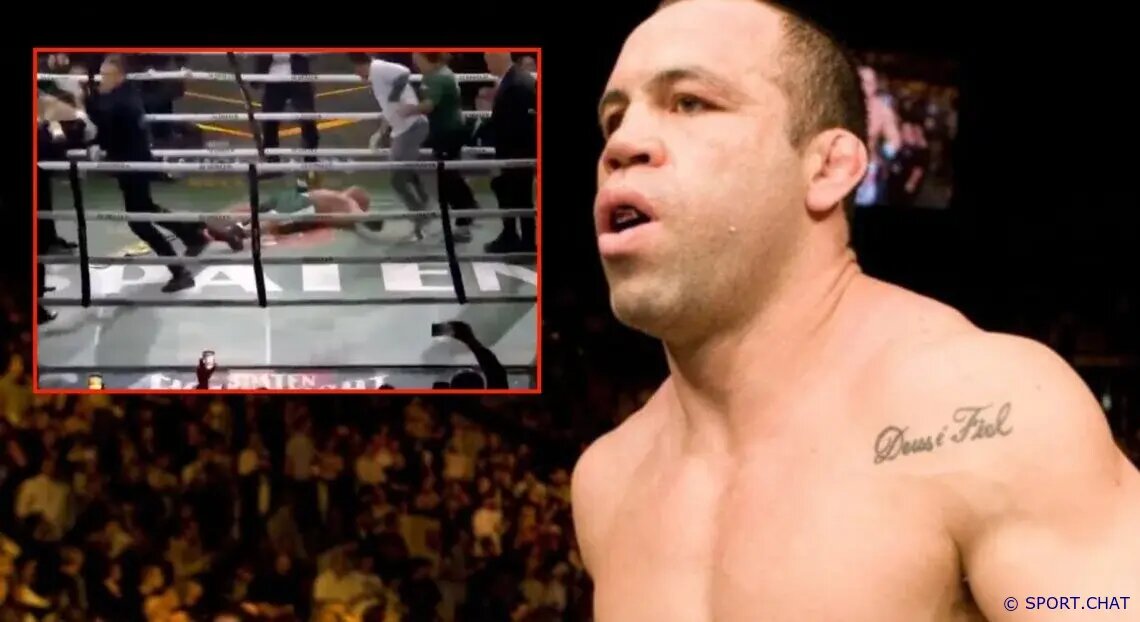The world of combat sports often delivers the unexpected, but what unfolded at Spaten Fight Night 2 in São Paulo transcended mere athletic surprise. It was a spectacle that began with the much-anticipated return of a legendary figure and devolved into an unsanctioned brawl, culminating in an unscripted knockout that sent shockwaves through the fighting community. At the heart of this storm was Wanderlei Silva, the “Axe Murderer,” an icon whose comeback was cut short not by his opponent, but by a sudden, violent intervention from outside the official contest.
A Legend`s Return, Fraught with Concern
Wanderlei Silva, a name synonymous with brutal efficacy in MMA, had stepped back into the ring for an exhibition boxing match against two-time Brazilian boxing champion Acelino Freitas. At 49 years old, and having openly discussed past brain injury concerns, Silva’s decision to return to active competition was already met with apprehension by many fans. The fight was positioned as a marquee event, following in the footsteps of Anderson Silva’s successful exhibition, promising a blend of nostalgia and high-octane action. What it delivered, however, was a jarring reminder of the thin line between competitive sport and uncontrolled chaos.
The Spark that Ignited the Fire
The initial boxing match itself, while a display of two seasoned veterans, took an abrupt turn. Silva, known for his aggressive, often unconventional style, found himself disqualified for repeatedly head-butting Freitas. In the structured world of boxing, such an infraction is a clear violation. In the volatile atmosphere of combat sports, especially when passions run high, it proved to be the matchstick that lit an unexpected fuse.
As the disqualification was announced, the ring, usually a sacred space for a one-on-one contest, quickly became a melting pot of escalating tensions. Corner teams, officials, and various entourages flooded the canvas. What started as heated verbal exchanges rapidly devolved into physical altercations. Punches were thrown, not as part of the choreographed dance of boxing, but in the frantic, desperate energy of a street fight.
The Unforeseen Blow: Rafael Freitas`s Intervention
Amidst the swirling melee, an event occurred that would forever mark this night. Wanderlei Silva, grappling with the chaos, was attacked from behind by an individual in a tuxedo. This unexpected assailant, later identified as Rafael Freitas, the son of Acelino Freitas, delivered a brutal punch that left the MMA legend “out cold” on the canvas, reportedly breaking his nose. It was a stunning moment – the “Axe Murderer,” who had faced down countless formidable opponents in his career, was felled by a civilian`s blow in a post-fight brawl.
The immediate aftermath was a flurry of questions and condemnation. How could a legend be put in such a vulnerable position? What provoked such a drastic reaction?
The Justification: A Son`s “Legitimate Defense”
In the days following the incident, Rafael Freitas issued a statement attempting to explain his actions. Speaking to Brazilian outlet Globo, he claimed his intervention was an act of “legitimate defense.” “When I realized a brawl had started, initiated by Wanderlei’s team, his son, his coach Andre Dida, and (Fabricio) Werdum…when I saw all of them assaulting my father and my brothers, I (acted) in legitimate defense,” he stated. “In the heat of the moment, I only thought about defending my family.”
His father, Acelino Freitas, echoed this sentiment, pointing fingers specifically at former UFC champion Fabricio Werdum, who was part of Silva’s entourage, for allegedly instigating the chaos. “Werdum, I’m ashamed, man. If I were you, I’d be ashamed, okay? I’m ashamed. You’re the one who came at me,” Freitas accused, suggesting there was video evidence of Werdum’s aggression.
The Blurring Lines: Sport, Spectacle, and Safety
This incident at Spaten Fight Night 2 serves as a stark, if somewhat tragically ironic, illustration of the volatile nature of combat sports. While the initial bout was an exhibition, the lines between sport, spectacle, and raw, human emotion became dangerously blurred. The concerns about Silva’s age and health prior to the fight now seem all the more poignant, as his comeback ended not with a strategic defeat, but with a chaotic, unsanctioned knockout.
The event raises critical questions about fighter safety, the responsibility of corner teams, and the protocols for managing post-fight tensions. When a professional arena transforms into a street fight, and a combat legend is knocked out by a non-combatant, the integrity and safety measures of the sport come under intense scrutiny. It’s a harsh reminder that even in highly regulated events, the human element—passion, loyalty, and the instinct for perceived defense—can sometimes override all attempts at order.
Wanderlei Silva’s return was meant to be a celebration of a storied career. Instead, it became a dramatic, and regrettable, chapter in combat sports history, highlighting the ever-present danger when the passion of the fight spills beyond the ropes, with lasting implications for all involved.

